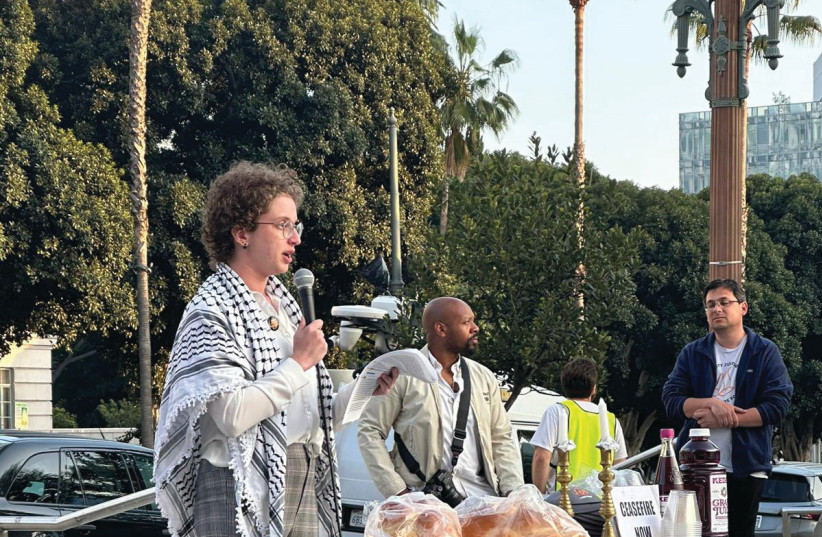IfNotNow-LA was very upset at what occurred on June 23 at Los Angeles’s Adas Torah synagogue, “horrified by the use of Jewish identity and sacred religious space as shields to promote the sale of real estate on occupied Palestinian land.”
It wasn’t that pro-Palestinian protesters gathered outside, with one vehicle climbing the sidewalk; chants of “Free, free Palestine – from the river to the sea”; and “long live Intifada,” including one person carrying a “spiked flag,” that bothered them. Nor was it a problem that “Zionism’s got to go” was shouted. It wasn’t that a Jewish institution was being targeted but that the protesters were “met with violence at the hands of a militant mob defending Israeli apartheid.”
What truly bothered them was that the synagogue was being utilized for a “political act.”
Politicization of antisemitism
A June 21 mobilizing call informed all that “Our land is not for sale! This Sunday, 6/23, a real estate event will be marketing homes in ‘Anglo neighborhoods’ in an effort to further occupy Palestine. Racist settler expansionists aren’t welcome in LA!”
But that wasn’t the full extent of the protest. After blocking the synagogue’s entrance, there was a march near Jewish businesses. Those stores were not selling real estate in Israel. Some protesters tried to enter the Beverly Hills Bagel Company across the street from Adas Torah but were blocked by the pro-Israel protesters. Bagels are not property nor are they racist. And anyone can eat them.

And IfNotNow-LA ex-post facto went along with all that. For them, what was truly critical was that “marketing these neighborhoods as ‘Anglo’ is a shameful but obvious attempt to create white, segregated neighborhoods in an ethno-nationalist apartheid state.”
What was that political act involved? IfNotNow-LA rejected the use of synagogues as shields.
While it might be unfair to point out that Hamas using their own fellow Gazans as shields is never denounced – even though it is an actual war crime – I do not think it unfair to wonder if a synagogue were to offer itself to be used as a place of “sanctuary” (and that did happen in 2017 and again in 2019) would IfNotNow denounce that? I am quite sure their progressive ideology would be quite accommodating for that political act.
BUYING PROPERTY in Israel is a very Jewish thing. Some might consider purchasing property in the Land of Israel as a religious obligation. At the very least, it is an ancient Jewish custom.
The founder of Judaism, Abraham, went to Hebron and, as recorded in Genesis 23, spoke to the children of Heth to intercede with Ephron to enable him to purchase a burial place for his wife, Sarah. In Joshua 24, we read of the purchase of another burial plot, this time in Shechem (Nablus). Jacob had made the transaction with Hamor and there, Joseph was interred. Later, David bought the threshing-floor of Aravnah, as we read in II Samuel 24, located on Mount Moriah in Jerusalem in preparation for the future construction of the Temple.
The Talmud, in Tractate Bava Kama,80B, notes that one who purchases a house in Eretz Yisrael can even have the bill of sale for the transaction written by a non-Jew even on Shabbat – something normatively prohibited. As clarified in Tractate Gitin 8B, when furthering of Jewish settlement of the Land of Israel, the rabbis did not apply the Shabbat prohibition.
In the 13th century, the Ramban was explicit regarding the value of acquiring property: “The fourth mitzvah (which the Rambam forgot to count in among his list of 613 mitzvot) is that we are commanded to inherit the land… we may not leave it in the hands of the other nations or leave it to be desolate. Concerning this, it is said, ‘and you shall take possession of the Land and settle it’” (Numbers 33:53-54).
Obtaining property by Jews in the Land of Israel is not a political act. It is a religious one. It is a fulfillment of Judaism. Jews had been doing this since ancient times without regard to the state of Jewish sovereignty over the land. In 1886, a special seal was created to mark the purchase of property by Moses Montefiore in Jerusalem. Previously, in 1860, together with money left to him by the American Judah Touro, Montefiore had bought the land upon which Mishkenot Sha’ananim in Jerusalem was built.
In the winter of 1885, the Beit Yehuda Society of Safed purchased 15,000 dunams in the central Golan. Due to difficulty in securing an Ottoman land deed, the site was abandoned but the society regrouped and purchased 2,000 dunams of land on the western slopes of the Golan.
Arieh Avneri’s book, The Claim of Dispossession: Jewish Land Settlement 1878-1948 dispels that “dispossession” myth and traces land purchases made by the Jews in the region of Palestine over many decades – Jews, repurchasing their national homeland from its occupiers.
The schismatic Jews who have found an ideological home among the progressives and who have adopted an intense anti-Zionism position should not be permitted to weaponize their brand of a distilled Judaism – a religion whose legacy opposes all their shenanigans and their agenda. It is they who are playing politics.
The writer is a researcher, analyst, and opinion commentator on political, cultural, and media issues.
